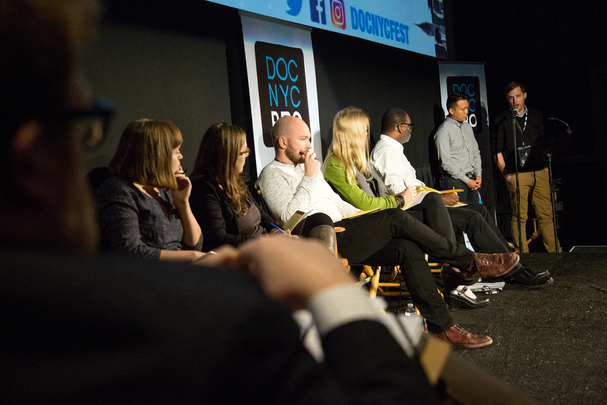
From the Field: The Importance of Pitching
Photo by: Doc NYC/Spencer Worthley
Filmmaker, Nathan Fitch shares with us the importance of pitching your film, and his experience at the DOC NYC Pitch Perfect event.
When an email arrived in my inbox announcing that Island Soldier, a PIC funded film, was to be among six projects selected to be part of the DOC NYC Pitch Perfect event, I found myself filled with conflicting emotions. On the one hand, the pitch would offer an incredible opportunity to present in front of a panel of top industry professionals from institutions such as POV, Sundance, and HBO. However, countering the elation of the news was the element of public speaking before an audience, a prospect that never fails to make me weak in the knees.
As uncomfortable as it may make some of us, participating in pitches is important because they can raise the profile of your film, and connect you with potential funding and distribution partners. As a case study, consider the example of CARE, a documentary about home elder care that was part of Good Pitch. According to director Deirdre Fishel, the film walked away from Good Pitch with $70,000 pledged from The Ford Foundation and the Fledgling Fund, and was subsequently also supported by several other organizations in attendance.
Contemplating the pitch, we asked ourselves, how can we impart the spirit of our film in our 10-minute slot? We decided upon a few key talking points, including, the unknown nature of our film’s narrative, and how the intimate access to our subjects came through strong community ties. We also knew that we needed to share a sense of our film’s characters as well as the overarching story of the film. DOC NYC had organized a training session the day before the pitch, where each team of filmmakers presented and received feedback from the group of filmmakers, which was very useful.
The pitch itself was a blur, but the practice certainly helped our performance greatly. Afterward, the panelists had time to ask questions and provide feedback on our pitch/trailer. The panel responded very positively to the visuals of our pitch and offered the useful piece of advice that for future presentations we should consider cutting a trailer that more fully showcased the characters of the film. Several members of the panel also asked clarifying questions, which proved to be a way to elaborate on elements that we had only had time to touch upon in the pitch/trailer. Other takeaways from our pitching experience include:
- Write a script for your pitch, practice it, then edit it based on feedback.
- Story! The panelists were very focused on the filmmakers’ ability to clearly communicate the film’s narrative and subjects.
- Be prepared to answer questions.
- Make your trailer align with your pitch (if you are going to talk about a character, show them in the trailer).
- Aim for clarity and avoid repetition.
Overall, our experience at Doc NYC proved to be a great opportunity to practice our communication skills, and connect with an amazing array of industry professionals. As storytellers, we may have a great film that we can already see projected on the inside of our eyelids, but what good is that if we cannot explain it to others who can help us bring it to life? Whether we are taking part in a pitch, or applying for funding for a film, there are certain elements that we need to be able to clearly express both in writing and verbally: What is the story, and why is it important? Who are the characters, and what is their journey? What resources do we need to make it happen? While it’s true that documentary production can be a process of discovery, it is critical to spend time considering these things before you step up to the mic for a pitch, or invest precious time applying for competitive funding.
Categories: None